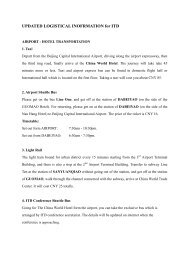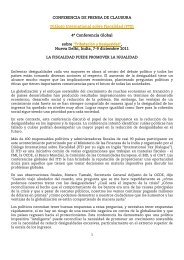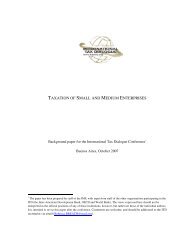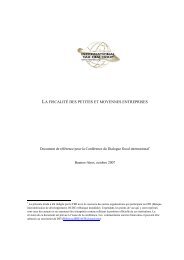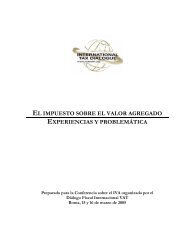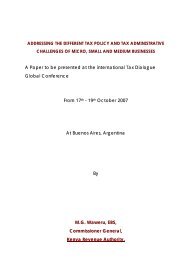Arcotia Hatsidimitris - International Tax Dialogue
Arcotia Hatsidimitris - International Tax Dialogue
Arcotia Hatsidimitris - International Tax Dialogue
Create successful ePaper yourself
Turn your PDF publications into a flip-book with our unique Google optimized e-Paper software.
8. TRANSFER PRICING AND DEVELOPING COUNTRIES – 69<br />
will help them to devise and implement transfer pricing rules suited to their strategic needs and their<br />
particular environment. The first difficulty is how to devise rules without having a full knowledge of the<br />
issues to be addressed and the problems that can arise. Learning from the experience of others is important<br />
in this context as even the most sophisticated transfer pricing regimes started in a modest way and were<br />
built up over time (many OECD countries had limited transfer pricing expertise in the 1970’s and ‘80’s).<br />
And best practice in transfer pricing is dynamic as it adapts to changes in the commercial environment that<br />
have been discussed in this report. While there is no one size fits all solution, nonetheless there are<br />
available guide legislation and regulations (the OECD has developed model legislation that can form the<br />
basis of new laws in developing countries) which developing countries can use as a starting point to<br />
develop their own rules and practices.<br />
Developing countries need to create a compliance regime that is proportionate to perceived risks,<br />
realistic in terms of its impact, and takes account of available capacity and capability. Developing countries<br />
will want to ensure that their tax administrations collect the right amount of tax; counter abusive transfer<br />
pricing tax planning, and create a predictable business climate, without double taxation wherever possible.<br />
An important first step is to put in place the necessary legislative framework-transfer pricing and thin<br />
capitalisation rules in particular. It is also important to take a practical approach; while expertise in these<br />
areas takes some time to build up it is important to make a start, tackling actual cases and developing the<br />
practical skills that are as important as an understanding of the principles of international taxation. And<br />
often tackling what is seen as “complex transfer pricing” may be relatively straight forward, for example, if<br />
a company is paying for goods and services (such as Head Office costs) when it has not received any real<br />
value, the cost may be disallowable on first principles.<br />
An early aspiration for developing countries should be to ensure that they have put in place with their<br />
main trading partners double taxation agreements with effective exchange of information provisions and<br />
domestic laws that enable them to secure necessary information and documentation. Developing countries<br />
will also want to make use of the internationally agreed principles of the OECD Transfer Pricing<br />
Guidelines to help in the struggle to stop the transfer of profits abroad while curtailing the double taxation<br />
of profits for international groups.<br />
Meeting the challenges<br />
Training and development of people<br />
Almost all the challenges referred to in the earlier chapters of this study apply to developing countries.<br />
Major accounting and law firms may also have limited resource in some developing countries but can call<br />
on their global resources if necessary to ensure they have all the expertise needed to handle transfer pricing<br />
cases whereas tax administrations can find themselves stretched by the complexity of cases, the lack of<br />
industry knowledge on the part of their people and a shortfall in relevant skills. These issues are often<br />
much more significant in developing countries.<br />
The African <strong>Tax</strong> Administration Forum (ATAF), set up by 34 African <strong>Tax</strong> Commissioners to provide<br />
an African voice in taxation and promote learning and skills in African tax administrations, recognises lack<br />
of capacity and capability as a critical issue for developing countries. But there are examples of transfer<br />
pricing teams with the right mix of skills and tax administrations that have structured themselves to<br />
maximise the effectiveness of their transfer pricing resources. ATAF’s members want to draw on the<br />
extensive and varied experience of developing and developed countries alike in building transfer pricing<br />
teams and how to position those teams within the tax administration.<br />
ATAF also recognises that there is a lack of transfer pricing skills and experience in many of their<br />
member countries and sees a critical need to build those skills as quickly as possible. They envisage this<br />
DEALING EFFECTIVELY WITH THE CHALLENGES OF TRANSFER PRICING © OECD 2012





